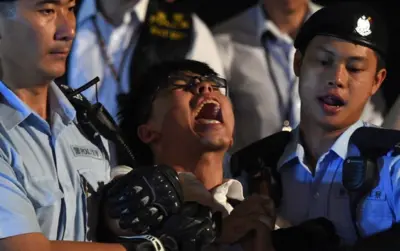We've updated our Privacy and Cookies Policy
We've made some important changes to our Privacy and Cookies Policy and we want you to know what this means for you and your data.
Obama's meeting with Dalai Lama irks China
Image source, The White House
US President Barack Obama has met the exiled Tibetan spiritual leader the Dalai Lama, US officials say.
The US leader vowed "strong support" for the protection of Tibetans' human rights in China during the encounter.
China had urged the US to cancel the meeting, saying it would "seriously impair China-US relations".
Beijing described the Dalai Lama as a separatist, while the spiritual leader said he only advocates greater autonomy for Tibet, not independence.
During their meeting in the White House Map Room, Mr Obama and the Dalai Lama reportedly said they hoped talks would resume between Beijing and the Tibetan spiritual leader's representatives.
The two men last met in 2011, in talks that angered China. Tibet is governed as an autonomous region in China.
China has been widely accused of repressing political and religious freedoms in Tibet. Beijing rejects this and says economic development has improved Tibetans' lives.
'Firm opposition'
Chinese response to the meeting was swift, with the nation's Vice-Foreign Minister Zhang Yesui summoning US charge d'affaires Daniel Kritenbrink to protest against the encounter.
"China expresses strong indignation and firm opposition," Mr Zhang said, according to the Xinhua news agency.
"The Tibetan issue is the domestic affair of China, and the United States bears no right to interfere," he added. "Such a move will gravely sabotage China-US co-operation and relations, and will definitely undermine its own interests."
Caitlin Hayden, a spokeswoman for the National Security Council, earlier said Mr Obama met the Dalai Lama "in his capacity as an internationally respected religious and cultural leader".
"We do not support Tibetan independence," she said, adding that the US "strongly supports human rights and religious freedom in China.
"We are concerned about continuing tensions and the deteriorating human rights situation in Tibetan areas of China."
In recent years more than 110 ethnic Tibetans - mostly young monks and nuns living in areas outside Tibet - have set themselves on fire in apparent protest against Beijing's rule.
The Chinese government accuses the Dalai Lama of orchestrating the protests, a charge he strongly rejects.
The Dalai Lama fled to India in 1959, after Chinese troops crushed an attempted uprising in Tibet.
He now advocates a "middle way" with Beijing, seeking autonomy but not independence.
Top Stories
More to explore
Most read
Content is not available








